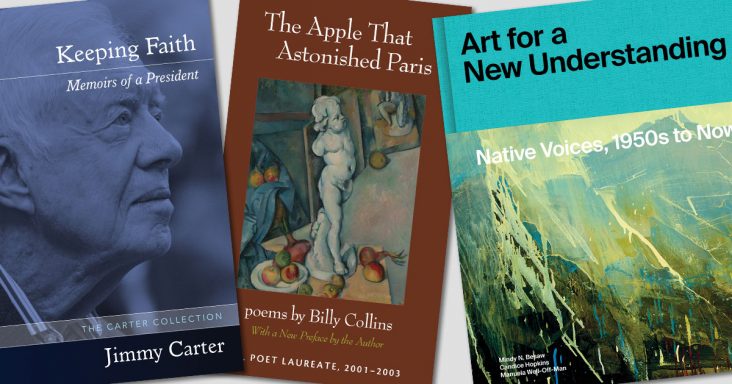UA Press celebrates extended 40th anniversary, Tyson Family Foundation grant
by July 14, 2021 1:09 pm 1,564 views

The University of Arkansas Press has published hundreds of books, catalogs and journals since it was established in 1980 as the university’s publishing arm. The press, celebrating an extended 40th anniversary, is converting all of its titles to digital format while building on its arts publications.
Recently, the Tyson Family Foundation provided a $300,000 grant to support that work. The Tyson Digital Library Fund and the Tyson Arts Publications Fund were established with the grant, supporting the press in the Division of Research and Innovation.
“My family has been a proud supporter of the UA Press for over 20 years, a legacy we are proud to continue through art publications and digital initiatives,” said Olivia Tyson, president of the Tyson Family Foundation. “Enhancing digital access to the incredible titles of the UA Press through this initiative will not only give the press’ catalog further reach but also position the press for the future.”
The Tyson Digital Library Fund will be used to recoup previous investments in digital book technologies, including the conversion to eBooks of about 300 titles. The UA Press will also use it for continued investment in digital book technology, including converting the remaining titles in its catalog.

“For decades, the UA Press has published the works of renowned authors, poets and scholars from their McIlroy House headquarters originating under the leadership of co-founder and beloved poet Miller Williams,” Tyson said. “My family has been proud to be a part of this legacy and continues its support through this gift.
“Personally, I’m honored to support our vital and vibrant literary community, and the UA Press is proof that creativity and the arts flourish right here in Northwest Arkansas,” Tyson added.
Mike Bieker, director and publisher of the University of Arkansas Press, said about two-thirds of the grant is dedicated to converting its books to digital format. He hopes that in 18 to 24 months, the press will have all of its books converted. The press must prepare the books before sending them to a third party for the conversion. The work is about half completed.
The press started producing digital files of each book it published about 20 years ago. Before then, the press maintained physical files for the books. The grant will help to digitize these and allow for high-quality scans of its oldest books for which production materials are not available, he said. With the press’ digital files, a printing company can print book copies.
“What that’s done is created what I call a digital library,” Bieker said. “It allows us an extreme amount of flexibility whenever it comes to printing our books, selling our books, and folks being able to access our books in any way. That’s huge.”
The Tyson Art Publications Fund comprises the remainder of the grant and will support books in the press’ art list, emphasizing those books authored or contributed to by Tyson Scholars. These scholars are doctoral candidates or equivalent, post-doctoral researchers, and senior scholars who are part of the Tyson Scholars of American Art Program, created in 2012 by Crystal Bridges Museum of American Art. Since it was established, 46 scholars have been named.
“We have been attracting — which is fantastic — art scholars on campus, and the money won’t be limited to Tyson Scholars,” he noted. “It will also be for anyone that’s doing wonderful art books.”
SIGNIFICANT MILESTONES
While the 40th anniversary of the press was in 2020, Bieker said the celebration was extended because “last year was so unusual.” Asked about the significance of the anniversary, he said, “every year that a press sustains is a good one for a university press and is a great thing for a university that aspires to be a top research university.”
The press is a member of the Association of University Presses and is one of about 120 university presses globally, Bieker said. The majority are in North America, with about 30 at universities overseas, he added. Bieker serves on the board for the Association of University Presses, the national and international association for university presses. Press membership requirements include having an editorial board comprising university faculty and committing to a peer review of publications.
UA professors Willard Gatewood and Miller Williams founded the University of Arkansas Press. At the time, Gatewood had compiled research on Arkansas governors he wanted to publish, but no commercial press thought the book would be commercially viable. Afterward, he reached out to the director of the Louisiana State University Press. The director declined the book but told Gatewood this was why a university press was needed in Arkansas. Gatewood and Williams, along with UA faculty, convinced the administration to form a press. Williams was its first director. “The Governors of Arkansas” was the first book it published.

Bieker has served for more than seven years as director and publisher. He said the press doesn’t publish books on all topics, such as fiction or military history, but specializes in specific fields to attract good manuscripts. It publishes food and sports studies and in architecture, art and Arkansas history. Also, it’s produced exhibit catalogs for Crystal Bridges that show the items in the exhibits and recently completed a two-volume catalog for the Historic Arkansas Museum in Little Rock. Another recent project regarded a book on Arkansas fish supported by the Arkansas Game & Fish Commission.
Often, scholars from other universities who might be seeking promotion or tenure submit books for publication, he said. Meanwhile, other university presses are publishing UA authors. Sometimes, those who have their book published will serve as anonymous reviewers for other books.
“The peer-review process that we facilitate … is the lifeblood of what university presses offer and do,” Bieker said. “It helps scholars that already have amazing scholarship. It makes it even better. By the time these books have been published, the work in it is impeccable.”
The press has consistently published about 20 books per year, he said. It has about 800 books, and almost all are still in print. New publications are available in digital and print formats. It also releases audiobooks. The press uses printers internationally to print its books.
The press has been based at the 2,500-square-foot McIlroy House on campus since December 1980. It has eight employees and room for growth. Bieker said growth is more about publishing better rather than more books.
Over the next three to five years, Bieker looks to further collaborate with the UA Libraries, specifically regarding low-cost and open-access educational resources for students. He also looks to improve its online store and develop customer relationships.
Another focus includes expanding its regional list, and the press is developing plans to publish smaller nature books, Native American poetry and good works of Arkansas history.
PUBLISHING HIGHLIGHTS
The press has published works by two-time U.S. poet laureate Billy Collins including his first book of poetry, “The Apple That Astonished Paris.” In the second edition’s preface, Collins credited Williams with being the first person to endorse him and called Williams his “first editorial father.” The book was published in 1988 when Williams was the press director.
“It sold fabulously for us by any standards, a commercial press or university press,” Bieker said. “We’ve sold thousands and thousands of copies of that book.”
The press also published President Jimmy Carter’s books. Williams and Carter became friends, and Williams started inviting Carter to Fayetteville for home poetry workshops.
“It was a fascinating story,” Bieker said. “President Carter would come into town. … Carter has probably written 60 books. And he was an aspiring poet as well. And Miller [Williams] kept him as a guest at his home for a week per year [with] Secret Service guys up and down the road. Throughout that friendship and back when books weren’t so easy to keep in print, President Carter made a deal with Miller and all his publishers that the big publishers that initially published the books would release them to the University of Arkansas Press once sales slowed to a point where they thought we’re ready to go on to the next book. The sales still for us were amazing. Plus, having the books on our list was fantastic.
“Personally, for me, it was great whenever I became director,” he added. “I was nervous about making sure that I did a good job. And I got a call about a week in, and it was President Carter on the phone wishing me good luck in running the press. It was really fantastic. It’s a great job and an honor to run the press.”
